人教版高中英语必修三(安徽卷)课时作业2
高一英语人教版必修三课时作业:2.1 section ⅰ warming up reading—pre-reading word版含答案
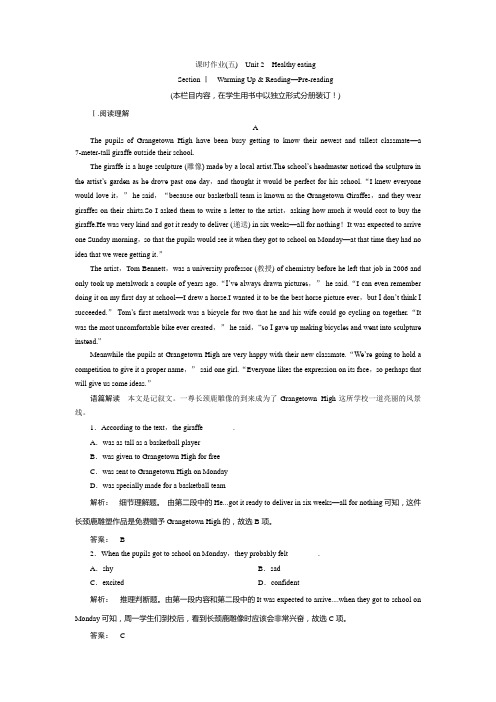
课时作业(五)Unit 2Healthy eatingSection ⅠWarming Up & Reading—Pre-reading(本栏目内容,在学生用书中以独立形式分册装订!)Ⅰ.阅读理解AThe pupils of Grangetown High have been busy getting to know their newest and tallest classmate—a 7-meter-tall giraffe outside their school.The giraffe is a huge sculpture (雕像) made by a local artist.The school’s headmaster noticed the sculpture in the artist’s garden as he drove past one day,and thought it would be perfect for his school.“I knew everyone would love it,” he said,“because our basketball team is known as the Grangetown Giraffes,and they wear giraffes on their shirts.So I asked them to write a letter to the artist,asking how much it would cost to buy the giraffe.He was very kind and got it ready to deliver (递送) in six weeks—all for nothing!It was expected to arrive one Sunday morning,so that the pupils would see it when they got to school on Monday—at that time they had no idea that we were getting it.”The artist,Tom Bennett,was a university professor (教授) of chemistry before he left that job in 2006 and only took up metalwork a couple of years ago.“I’ve always drawn pictures,” he said.“I can even remember doing it on my first day at school—I drew a horse.I wanted it to be the best horse picture ever,but I don’t think I succeeded.”Tom’s f irst metalwork was a bicycle for two that he and his wife could go cycling on together.“It was the most uncomfortable bike ever created,” he said,“so I gave up making bicycles and went into sculpture instead.”Meanwhile the pupils at Grangetown High are very happy with their new classmate.“We’re going to hold a competition to give it a proper name,” said one girl.“Everyone likes the expression on its face,so perhaps that will give us some ideas.”语篇解读本文是记叙文。
人教版高中英语必修第三册UNIT 3 Period 2课时作业含答案

UNIT 3Period Two基础练Ⅰ.单句语法填空1.His little son admitted ________ (take) some cash from the drawer last night.2.Tell me how you could escape ________ (hurt) in the accident.3.The students must keep a journal and then write a report about ________ they have learned.4.Our teacher said the date of the sports meeting had not been ________ (definite) decided yet.5.It is reported that heart disease is the biggest killer, ________ (claim) 180,000 lives a year.6.It is announced that the final team ________ (select) will be made tomorrow.7.Having sought ________ a solution to the problem for several days, they finally found one.8.Only a ________ (minor) of the people supported the revolution.【答案】1.taking/having taken2.being hurt3.what4.definitely5.claiming6.selection7.for8.minorityⅡ.短语填空earn a living, be home to, bring about, used to, series of, apart from 1.I think the __________ paintings is really her great achievement.2.Environmental pollution will __________ all kinds of problems.3.I don’t know anyone at the party ________ Jim and his brother.4.I __________ smoke, but I gave it up two years ago because of illness.5.This church in England is said to ________ the world’s oldest clock.【答案】1.series of2.bring about3.apart from4.used to5.be home toⅢ.完成句子1.It was not long before they left their village to ____________________ in the south.不久他们就离开了家乡,到南方闯世界去了。
2017-2018学年人教版高中英语必修3全册课时作业含解析答案

2017-2018学年高中英语人教版必修3全册课时作业目录课时作业(一)Module 1Section Ⅰ (1)课时作业(二)Module 1Section Ⅱ (8)课时作业(三)Module 1Section Ⅲ (15)课时作业(五)Unit 2Healthy eating (22)课时作业(六)Unit 2Healthy eating (29)课时作业(七)Unit 2Healthy eating (35)课时作业(八)Unit 2Healthy eating (41)课时作业(九)Unit 3The Million Pound Bank Note (47)课时作业(十)Unit 3The Million Pound Bank Note (53)课时作业(十一)Unit 3The Million Pound Bank Note (59)课时作业(十二)Unit 3The Million Pound Bank Note (64)课时作业(十三)Unit 4Astronomy: the science of the stars (71)课时作业(十四)Unit 4Astronomy: the science of the stars (77)课时作业(十五)Unit 4Astronomy: the science of the stars (83)课时作业(十六)Unit 4Astronomy: the science of the stars (88)课时作业(十七)Unit 5Canada—“The True North” (94)课时作业(十八)Unit 5Canada—“The True North” (101)课时作业(十九)Unit 5Canada—“The True North” (107)课时作业(二十)Unit 5Canada—“The True North” (112)课时作业(一)Module 1Section ⅠⅠ.单词拼写1.The museum has several lifesized s________ of people and animals.答案:sculptures2.The country is now being g________ by the Labour Party.答案:governed3.People have lived in this valley since a________ times.答案:ancient4.The wheel in the Indian flag is a s________ of peace.答案:symbol5.By the way, w________ in Beijing do you live?答案:whereabouts6.We live ________ (在……对面) the school, so we often go to school on foot.答案:opposite7.The boy is brave enough to swim ________ (横过) the river.答案:across8.My uncle's ________ (出生地) is Shanghai.答案:birthplace9.A new factory is to be ________ (位于) on this site.答案:located10.The ________ (文明) of mankind has taken thousands of years.答案:civilisationⅡ.用括号内所给单词的适当形式填空1.As we all know, there are seven ________ (continental) and four oceans in the world.答案:continents2.His father is an experienced ________ (architecture) and he is always busy designing new buildings.答案:architect3.In this museum there are works ________ (production) by famous artists of all time.答案:produced4.________ (face) with a sudden job loss, would you consider it a failure, or an opportunity for a new start in your career?答案:Faced5.The room ________ (design) as a dining hall is now a visitors' centre.答案:designed6.The city ________ (government) by the famous mayor develops very smoothly.答案:governed7.Shanghai is a city of China, ________ (situate) on the River Huangpu.答案:situated8.The company wants to ________ (location) the factory on land near the railway.答案:locate9.He is one of the most ________ (influence) figures in the government.答案:influential10.The terrorist's attack on the UN building has shocked the ________ (civilisation) world.答案:civilizedⅢ.单句改错1.This restaurant has become popular for its wide ranges of foods that suit all tastesand pockets.________答案:ranges→range2.The ground is covering with water. It must have rained last night.________答案:covering→covered3.The parking lot, which is situating in the centre of the town, is not so large.________答案:situating→situated4.She is no more than a teacher; she is also an intimate friend to us.________答案:去掉no5.Nearly 70% of the fund are supplied by the government.________答案:are→is6.The openair celebration has been put off because the bad weather.________答案:because后加ofⅣ.阅读理解AAs a boy growing up in India, I had longed to travel abroad. I used to listen to the stories my father would tell me about his stay in Canada and tours to Europe in the 1970s,with great interest.My big moment finally came in the summer of 1998 when I was able to accompany my parents to Europe, where my father was to attend a meeting. We planned to travel to Belgium, Netherlands and West Germany.I have vivid memories even today of going to Mumbai airport at night all excited about finally going abroad. I had heard several great things about Lufthansa till then but now I finally got to experience them first hand, during the flight to Frankfurt. We flew business class and even today I can remember the excellent service by the Lufthansa crew. The flight was really smooth and thoroughly enjoyable, even for someone like me, who is otherwise scared of flying.After spending almost two weeks in Europe, we took the Lufthansa airport express from Dusseldorf to Frankfurt airport, for our return flight. What a journey that was! All along the Rhine (莱茵河), it was simply an unforgettable experience. I was in a sombre mood on the flight back to Mumbai as it marked the end of a wonderful vacation, but the Lufthansa crew members were able to change it into a most enjoyable experience yet again, with the quality of their service.Being the first airline to take me overseas, Lufthansa will always hold a special place in my heart. Even today, I continue to enjoy flights on Lufthansa and simply cannot dream of choosing any other airline. Flying, in general, for me, has always been an ordeal (terrible and painful experience). Flying on Lufthansa, however, is something I always have and always will look forward to.【文章大意】本文是一篇记叙文。
英语人教版必修3课时作业 Unit 2 Grammar

课时作业7GrammarⅠ.同义句转换1.His restaurant ought to be full of people.His restaurant ought to be filled with people.2.He often lies, so no one believes him.He often tells a lie,_so no one believes him.3.But Li Maochang seemed not to hear.But it seemed that Li Maochang didn't hear.4.I don't like energy-giving food any longer.I'm tired of energy-giving food.5.I don't know how they were not punished for breaking the window.I don't know how they got away with breaking the window.Ⅱ.用情态动词的肯定或否定形式填空1.—Is there anything I need to know before I start?—You mustn't use the office phone for private calls.2.—They ought_to/should have prepared for the meeting more carefully.—But they didn't. What a pity!3.—Excuse me, where is the nearest bank?—Go straight ahead; you can't/won't miss it, which is a huge building.4.—So you have to leave now.—Yes, I have_to.—How nice it would be if you could stay a bit longer!5.—I will furnish your room with the best computer and television.—You needn't. I prefer a bookshelf to do some reading in my spare time.6.—Why are your eyes so red? You can't/couldn't have slept well last night.—Yeah, I stayed up late writing a report.7.Tom, you mustn't leave all your clothes on the floor like this?8.—Need she attend the meeting?—Yes, she must. It's very important to her.9.—Must I do it now?—No, you needn't.10.—Catherine, I have cleaned the room for you.—Thanks. You needn't_have_done it. I could manage it myself.Ⅲ.句型训练1.Henry is feeling uncomfortable. He must_have_drunk too much at the party last night.亨利感觉不舒服。
人教版高中英语必修三(课标卷)课时作业2
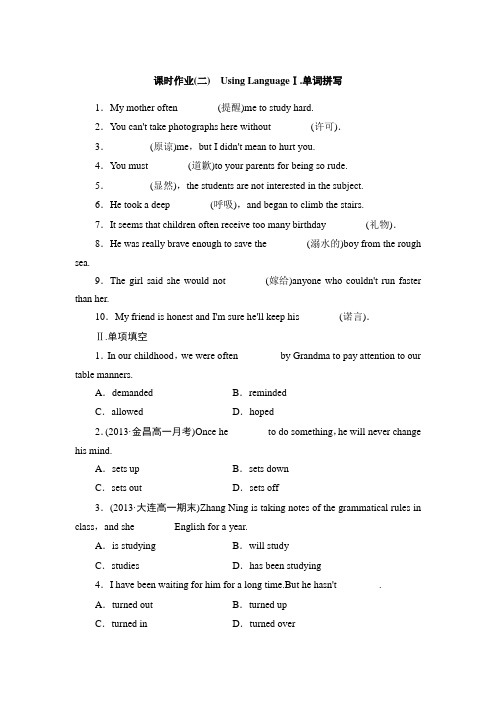
课时作业(二)Using LanguageⅠ.单词拼写1.My mother often________(提醒)me to study hard.2.You can't take photographs here without________(许可).3.________(原谅)me,but I didn't mean to hurt you.4.You must________(道歉)to your parents for being so rude.5.________(显然),the students are not interested in the subject.6.He took a deep________(呼吸),and began to climb the stairs.7.It seems that children often receive too many birthday________(礼物).8.He was really brave enough to save the________(溺水的)boy from the rough sea.9.The girl said she would not________(嫁给)anyone who couldn't run faster than her.10.My friend is honest and I'm sure he'll keep his________(诺言).Ⅱ.单项填空1.In our childhood,we were often ________by Grandma to pay attention to our table manners.A.demanded B.remindedC.allowed D.hoped2.(2013·金昌高一月考)Once he________to do something,he will never change his mind.A.sets up B.sets downC.sets out D.sets off3.(2013·大连高一期末)Zhang Ning is taking notes of the grammatical rules in class,and she________English for a year.A.is studying B.will studyC.studies D.has been studying4.I have been waiting for him for a long time.But he hasn't ________.A.turned out B.turned upC.turned in D.turned over5.He was almost ________ breath after he had ________ his breath for oneminute and he had to ________ a deep breath to relax himself.A.out;taken;holdB.out of;held;takeC.tired out;stopped;hadD.tired of;paused;have6.(2013·洛阳高一检测)He is not a man who________.Don't believe in him.A.keeps his words B.keeps his wordC.keeps a word D.keeps the word7.Mike apologized ________Jane ________what he had said.A.to;for B.to;withC.for;for D.with;about8.________ was quite obvious ________they had no desire for peace.A.It;that B.what;itC.That;what D.They;it9.It is usually very cool in Tom's hometown in September.But it ________be rather hot sometimes.A.must B.canC.should D.would10.Peter received a letter just now ________ his grandma would come to see him soon.A.said B.saysC.saying D.to sayⅢ.阅读理解APeople in the United States honor their parents with two special days:Mother's Day,on the second Sunday in May,and Father's Day,on the third Sunday in June.These days are set aside to show love and respect for parents.They raise their children and educate them to be responsible citizens.They give love and care.These two days offer an opportunity to think about the changing roles of mothers and fathers.More mothers now work outside the home.More fathers must help with child care.These two special days are celebrated in many different ways.On Mother's Day people wear carnations.A red one symbolizes a living mother.A white one shows that the mother is dead.Many people attend religious services to honor parents.It is also a day when people whose parents are dead visit the cemetery (公墓).On these days families get together at home,as well as in restaurants.They often have outdoor barbecues for Father's Day.These are days of fun and good feelings and memories.Another tradition is to give cards and gifts.Children make them in school.Many people make their own presents.These are valued more than the ones bought in stores.It is not the value of the gift that is important,but it is “the thought that counts”.Greeting card stores,florists,candy makers,bakeries,telephone companies,other stores do lots of business during these holidays.1.Which is NOT a reason for children to show love and respect for parents?A.Parents bring up children.B.Parents give love and care to children.C.Parents educate children to be good persons.D.Parents pass away before children grow up.2.What do you know from the passage?A.Mother's Day and Father's Day are both in May.B.Fewer women worked outside the home in the past.C.Not all the children respect their parents.D.Fathers are not as important as mothers at home.3.Which do you think is right about “carnation”?A.It only has two kinds of color.B.It refers to the special clothes people wear on Mother's Day or Father's Day.C.It's a kind of flower showing love and best wishes.D.People can wear carnations only on the second Sunday in May.4.On Mother's Day and Father's Day ,________.A.people usually have family partiesB.everyone goes to visit the cemeteryC.children always go to parents' homeD.tsBIt's hard to avoid looking like a fool on April Fool's Day.On April 1 each year,people play tricks on each other.These tricks are usually silly rather than mean.Classmates sometimes tie each other's shoelaces to their chairs.Teachers might hand out an impossibly difficult surprise test that scares students before they realize it's only a joke.Newspapers announce fake contests(such as“Win an elephant!”)and report on fake stories(like“UFO” lands in New York City).Forget gifts,songs and special foods—those are for the other holidays of the year.On April Fool's Day,the only tradition is to laugh (and maybe to cause a little bit of trouble).One April Fool's Day,when I was in high school,a group of students in my class played a very clever and funny trick on the teachers.They bought some chickens and set them free in our school cafeteria.The chickens ran all round the school,in and out of classrooms and under our feet.Feathers were flying everywhere.Teachers began running after the chickens,trying to catch them.Finally,they caught four of them.But the chickens were wearing numbered tags(商标)around their necks,and the teachers discovered that they had only caught chickens No.1,2,3,and 5.Where was chicken No.4?The teachers looked and looked.They couldn't find another chicken.After a few hours,they realized that the students had played another joke on them:There were only four chickens in the first place!They've been tricked by the numbers on the chickens.It's been a long time since I was in high school,but that April Fool's Day remains one of my favorite memories from those years.5.What can we infer from the first paragraph on April Fool's Day?A.Everyone is hard to avoid being fooled on April Fool's Day.B.Students play jokes on teachers on April Fool's Day.C.Teachers play tricks on students on April Fool's Day.D.Newspapers often cheat people.6.Why did students set chickens free?A.They wanted to let chickens free.B.They wanted to let chickens run all round the school.C.They wanted to see feathers flying.D.They wanted to play a trick on teachers.7.How many jokes did the students play on teachers?A.One. B.Two.C.Three. D.Four.8.What's the title of the passage?A.An unforgettable April Fool's DayB.April Fool's DayC.The origin of April Fool's DayD.What do people do on April Fool's Day?Ⅳ.翻译句子1.他是个守信用的人。
高中英语人教版必修3课时作业:Unit 2 Healthy eating 5 含答案
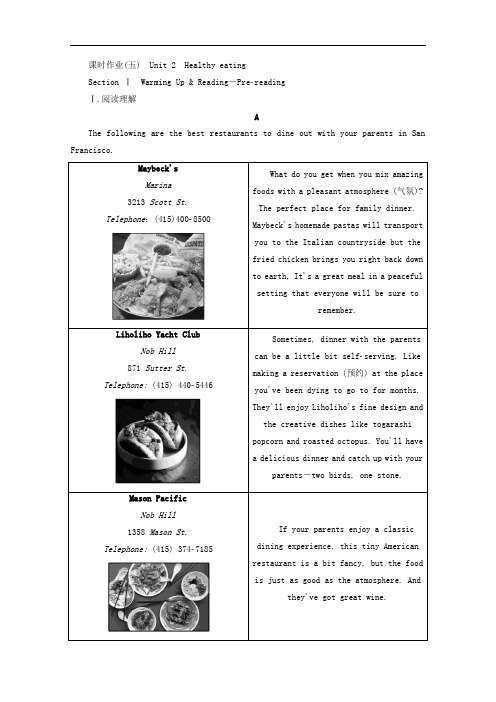
Liholiho Yacht ClubNob Hill871 Sutter St. Telephone: (415) 4405446Mason PacificNob Hill1358 Mason St. Telephone: (415) 3747185Heirloom Café Mission 2500 Folsom St . Telephone: (415) 8212500One good tip for deciding on the placeto take your parents to dinner: listen totheir opinions. If they love a restaurantand keep telling you to go to it, chancesare you should book a table for all of you.For yours truly, that is Heirloom Café.The food is always fresh, the atmosphereis clean but relaxed and the service isalways friendly. 【文章大意】 本文是应用文,话题是新闻广告类。
文章介绍了旧金山的几个适合和父母一起吃饭的餐馆。
1.What can you enjoy at Maybeck's?A .Some creative dishes.B .Delicious fried chicken.C .Different homemade foods.D .Foods from the Italian countryside.解析:B 细节理解题。
根据第一个餐馆介绍中的...the fried chicken brings you right back down to earth 可知,在该餐馆里可以吃到炸鸡。
安徽省2014-2021学年高中英语同步练习(2)及答案:Unit3(人教新课标必修3)
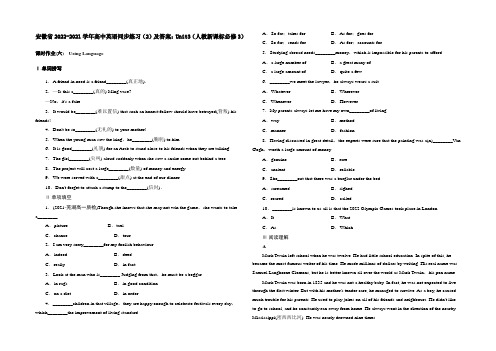
安徽省2022-2021学年高中英语同步练习(2)及答案:Unit3(人教新课标必修3)课时作业(六)Using LanguageⅠ.单词拼写1.A friend in need is a friend________(真正地).2.—Is this a________(真的) Ming vase?—No,it's a fake.3.It would be________(难以置信) that such an honest fellow should have betrayed(背叛) his friends!4.Don't be so________(无礼的) to your mother!5.When the young man saw the king,he________(鞠躬) to him.6.It is good________(礼貌) for an Arab to stand close to his friends when they are talking.7.The girl________(尖叫) aloud suddenly when she saw a snake come out behind a tree.8.The project will cost a large________(数量) of money and energy.9.We were served with a________(甜点) at the end of our dinner.10.Don't forget to attach a stamp to the________(信封).Ⅱ.单项填空1.(2021·芜湖高一质检)Though she knows that she may not win the game,she wants to takea________.A.picture B.taxiC.chance D.tour2.I am very sorry________for my foolish behaviour.A.indeed B.deedC.really D.in fact3.Look at the man who is________.Judging from that,he must be a beggar.A.in rags B.in good conditionC.on a diet D.in order4.________children in that village,they are happy enough to celebrate festivals every day,which________the improvement of living standard.A.So far;takes for B.As for;goes forC.So far;sends for D.As for;accounts for5.Studying abroad needs________money,which is impossible for his parents to afford.A.a large number of B.a great many ofC.a large amount of D.quite a few6.________we meet the lawyer,he always wears a suit.A.Whatever B.WhereverC.Whenever D.However7.My parents always let me have my own________of living.A.way B.methodC.manner D.fashion8.Having discussed in great detail,the experts were sure that the painting was a(n)________Van Gogh,worth a large amount of money.A.genuine B.rareC.ancient D.reliable9.She________out that there was a burglar under the bed.A.screamed B.sighedC.roared D.called10.________is known to us all is that the 2022 Olympic Games took place in London.A.It B.WhatC.As D.WhichⅢ.阅读理解AMark Twain left school when he was twelve. He had little school education. In spite of this, he became the most famous writer of his time. He made millions of dollars by writing. His real name was Samuel Langhorne Clemens, but he is better known all over the world as Mark Twain,his pen name.Mark Twain was born in 1835 and he was not a healthy baby. In fact, he was not expected to live through the first winter. But with his mother's tender care, he managed to survive. As a boy, he caused much trouble for his parents. He used to play jokes on all of his friends and neighbours. He didn't like to go to school, and he constantly ran away from home. He always went in the direction of the nearby Mississippi(密西西比河). He was nearly drowned nine times.After his father's death in 1847, Mark Twain began to work for a printer, who only provided him with food and clothing. Then,he worked as a printer,a river-boat pilot(领航员) and later joined the army. But shortly after that he became a miner. During this period, he started to write short stories. Afterwards he became a full-time writer.In 1870, Mark Twain got married. In the years that followed he wrote many books including Tom Sawyer in 1876, and Huckleberry Finn in 1884, which made him famous, and brought him a great fortune.Unfortunately, Mark Twain got into debts in bad investments(投资) and he had to write large numbers of stories to pay these debts. In 1904, his wife died, and then three of their children passed away.At the age of 70, his hair was completely white. He bought many white suits and neckties(领带). He wore nothing but white from head to foot until his death on April 21,1910.1.Mark Twain left school at 12 to________.A.work as a printer B.write storiesC.join the army D.make a living2.Which of the following about Mark Twain is NOT true?A.He was not a healthy boy.B.He caused much trouble for his parents.C.He gained lots of money by writing.D.He had a happy childhood but a sad later life.3.Arrange the following facts about Mark Twain's life in order of time.a. working as a printerb. working as a river-boat pilotc. working as a minerd. joining the armye. working as a full-time writerA.a,b,c,d,e B.a,b,d,c,eC.a,c,b,d,e D.c,a,b,d,e4.________brought him fame and lots of money.A.His works B.His investmentsC.His printing D.His familyB(2021·陕西高考)In 1978, I was 18 and was working as a nurse in a small town about 270 km away from Sydney, Australia. I was looking forward to having five days off from duty. Unfortunately,the only one train a day back to my home in Sydney had already left. So I thought I'd hitch a ride(搭便车).I waited by the side of the highway for three hours but no one stopped for me. Finally,a man walked over and introduced himself as Gordon. He said that although he couldn't give me a lift,I should come back to his house for lunch. He noticed me standing for hours in the November heat and thought I must be hungry. I was doubtful as a young girl but he assured(使……放心) me I was safe,and he also offered to help me find a lift home afterwards. When we arrived at his house, he made us sandwiches. After lunch,he helped me find a lift home.Twenty-five years later, in 2003, while I was driving to a nearby town one day, I saw an elderly man standing in the glaring heat, trying to hitch a ride. I thought it was another chance to repay someone for the favour I'd been given decades earlier. I pulled over and picked him up. I made him comfortable on the back seat and offered him some water.After a few moments of small talk, the man said to me,“You haven't changed a bit, even your red hair is still the same.”I couldn't remember where I'd met him. He then told me he was the man who had given me lunch and helped me find a lift all those years ago. It was Gordon.5.The author had to hitch a ride one day in 1978 because________.A.her work delayed her trip to SydneyB.she was going home for her holidaysC.the town was far away from SydneyD.she missed the only train back home6.Which of the following did Gordon do according to Paragraph 2?A.He helped the girl find a ride.B.He gave the girl a ride back home.C.He bought sandwiches for the girl.D.He watched the girl for three hours.7.The reason why the author offered a lift to the elderly man was that________.A.she realized he was GordonB.she had known him for decadesC.she was going to the nearby townD.she wanted to repay the favour she once got8.What does the author want to tell the readers through the story? A.Giving sometimes produces nice results.B.Those who give rides will be repaid.C.Good manners bring about happiness.D.People should offer free rides to others.Ⅳ.翻译句子1.别冒险把车开得太快。
新教材高中英语课时作业2UNIT1ART含解析新人教版选择性必修第三册
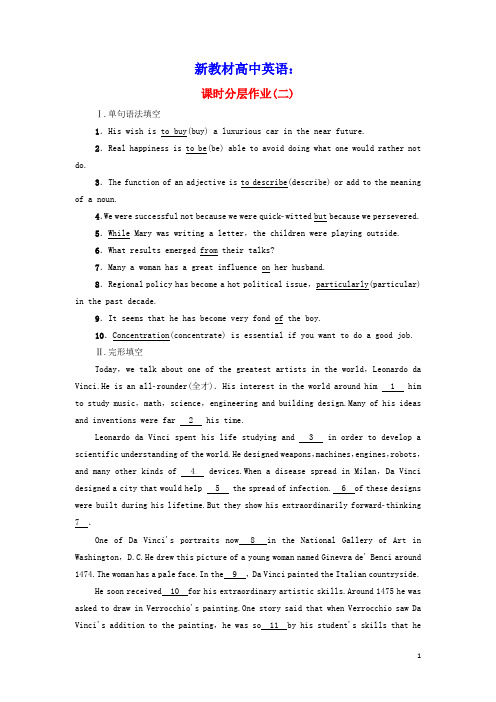
新教材高中英语:课时分层作业(二)Ⅰ.单句语法填空1.His wish is to buy(buy) a luxurious car in the near future.2.Real happiness is to be(be) able to avoid doing what one would rather not do.3.The function of an adjective is to describe(describe) or add to the meaning of a noun.4.We were successful not because we were quickwitted but because we persevered.5.While Mary was writing a letter,the children were playing outside.6.What results emerged from their talks?7.Many a woman has a great influence on her husband.8.Regional policy has become a hot political issue,particularly(particular) in the past decade.9.It seems that he has become very fond of the boy.10.Concentration(concentrate) is essential if you want to do a good job.Ⅱ.完形填空Today,we talk about one of the greatest artists in the world,Leonardo da Vinci.He is an allrounder(全才).His interest in the world around him 1 him to study music,math,science,engineering and building design.Many of his ideas and inventions were far 2 his time.Leonardo da Vinci spent his life studying and 3 in order to develop a scientific understanding of the world.He designed weapons,machines,engines,robots,and many other kinds of 4 devices.When a disease spread in Milan,Da Vinci designed a city that would help 5 the spread of infection. 6 of these designs were built during his lifetime.But they show his extraordinarily forwardthinking 7 .One of Da Vinci's portraits now 8 in the National Gallery of Art in Washington,D.C.He drew this picture of a young woman named Ginevra de' Benci around 1474.The woman has a pale face.In the 9 ,Da Vinci painted the Italian countryside.He soon received 10 for his extraordinary artistic skills.Around 1475 he was asked to draw in Verrocchio's painting.One story said that when Verrocchio saw Da Vinci's addition to the painting,he was so 11 by his student's skills that hesaid he would never paint again.Da Vinci's most famous portrait is Mona Lisa.It is now in the 12 of the Louvre Museum in Paris.He painted this 13 of Lisa Gherardini starting around 1503.She was the wife of a wealthy businessman from Florence named Francesco del Giocondo.Lisa Gherardini is sitting with her hands crossed in her lap.She looks 14 at the painter.She seems to be smiling ever so slightly.A lot of 15 surround the painting.Experts are not sure about how or why Leonardo da Vinci came to paint the work.But they do know that he never gave it to the Giocondo family.He kept the painting with him for the rest of his life.【语篇解读】这是一篇人物介绍。
- 1、下载文档前请自行甄别文档内容的完整性,平台不提供额外的编辑、内容补充、找答案等附加服务。
- 2、"仅部分预览"的文档,不可在线预览部分如存在完整性等问题,可反馈申请退款(可完整预览的文档不适用该条件!)。
- 3、如文档侵犯您的权益,请联系客服反馈,我们会尽快为您处理(人工客服工作时间:9:00-18:30)。
高中英语学习材料(灿若寒星*制作整理)课时作业(二)Using LanguageⅠ.单词拼写1.My mother often________(提醒)me to study hard.2.You can't take photographs here without________(许可).3.________(原谅)me,but I didn't mean to hurt you.4.You must________(道歉)to your parents for being so rude.5.________(显然),the students are not interested in the subject.6.He took a deep________(呼吸),and began to climb the stairs.7.It seems that children often receive too many birthday________(礼物).8.He was really brave enough to save the________(溺水的)boy from the rough sea.9.The girl said she would not________(嫁给)anyone who couldn't run faster than her.10.My friend is honest and I'm sure he'll keep his________(诺言).Ⅱ.单项填空1.In our childhood,we were often ________by Grandma to pay attention to our table manners.A.demanded B.remindedC.allowed D.hoped2.(2013·凤阳高一月考)Once he________to do something,he will never change his mind.A.sets up B.sets downC.sets out D.sets off3.(2013·定远高一期末)Zhang Ning is taking notes of the grammatical rules in class,and she________English for a year.A.is studying B.will studyC.studies D.has been studying4.I have been waiting for him for a long time.But he hasn't ________.A.turned out B.turned upC.turned in D.turned over5.He was almost ________ breath after he had ________ his breath for one minute and he had to ________ a deep breath to relax himself.A.out;taken;holdB.out of;held;takeC.tired out;stopped;hadD.tired of;paused;have6.(2013·宿州高一检测)He is not a man who________.Don't believe in him.A.keeps his words B.keeps his wordC.keeps a word D.keeps the word7.Mike apologized ________Jane ________what he had said.A.to;for B.to;withC.for;for D.with;about8.________ was quite obvious ________they had no desire for peace.A.It;that B.what;itC.That;what D.They;it9.It is usually very cool in Tom's hometown in September.But it ________be rather hot sometimes.A.must B.canC.should D.would10.Peter received a letter just now ________ his grandma would come to see him soon.A.said B.saysC.saying D.to sayⅢ.阅读理解APeople in the United States honor their parents with two special days:Mother's Day,on the second Sunday in May,and Father's Day,on the third Sunday in June.These days are set aside to show love and respect for parents.They raise theirchildren and educate them to be responsible citizens.They give love and care.These two days offer an opportunity to think about the changing roles of mothers and fathers.More mothers now work outside the home.More fathers must help with child care.These two special days are celebrated in many different ways.On Mother's Day people wear carnations.A red one symbolizes a living mother.A white one shows that the mother is dead.Many people attend religious services to honor parents.It is also a day when people whose parents are dead visit the cemetery (公墓).On these days families get together at home,as well as in restaurants.They often have outdoor barbecues for Father's Day.These are days of fun and good feelings and memories.Another tradition is to give cards and gifts.Children make them in school.Many people make their own presents.These are valued more than the ones bought in stores.It is not the value of the gift that is important,but it is “the thought that counts”.Greeting card stores,florists,candy makers,bakeries,telephone companies,other stores do lots of business during these holidays.1.Which is NOT a reason for children to show love and respect for parents?A.Parents bring up children.B.Parents give love and care to children.C.Parents educate children to be good persons.D.Parents pass away before children grow up.2.What do you know from the passage?A.Mother's Day and Father's Day are both in May.B.Fewer women worked outside the home in the past.C.Not all the children respect their parents.D.Fathers are not as important as mothers at home.3.Which do you think is right about “carnation”?A.It only has two kinds of color.B.It refers to the special clothes people wear on Mother's Day or Father's Day.C.It's a kind of flower showing love and best wishes.D.People can wear carnations only on the second Sunday in May.4.On Mother's Day and Father's Day ,________.A.people usually have family partiesB.everyone goes to visit the cemeteryC.children always go to parents' homeD.most valuable giftsBIt's hard to avoid looking like a fool on April Fool's Day.On April 1 each year,people play tricks on each other.These tricks are usually silly rather than mean.Classmates sometimes tie each other's shoelaces to their chairs.Teachers might hand out an impossibly difficult surprise test that scares students before they realize it's only a joke.Newspapers announce fake contests(such as“Win an elephant!”)and report on fake stories(like“UFO” lands in New York City).Forget gifts,songs and special foods—those are for the other holidays of the year.On April Fool's Day,the only tradition is to laugh (and maybe to cause a little bit of trouble).One April Fool's Day,when I was in high school,a group of students in my class played a very clever and funny trick on the teachers.They bought some chickens and set them free in our school cafeteria.The chickens ran all round the school,in and out of classrooms and under our feet.Feathers were flying everywhere.Teachers began running after the chickens,trying to catch them.Finally,they caught four of them.But the chickens were wearing numbered tags(商标)around their necks,and the teachers discovered that they had only caught chickens No.1,2,3,and 5.Where was chicken No.4?The teachers looked and looked.They couldn't find another chicken.After a few hours,they realized that the students had played another joke on them:There were only four chickens in the first place!They've been tricked by the numbers on the chickens.It's been a long time since I was in high school,but that April Fool's Day remains one of my favorite memories from those years.5.What can we infer from the first paragraph on April Fool's Day?A.Everyone is hard to avoid being fooled on April Fool's Day.B.Students play jokes on teachers on April Fool's Day.C.Teachers play tricks on students on April Fool's Day.D.Newspapers often cheat people.6.Why did students set chickens free?A.They wanted to let chickens free.B.They wanted to let chickens run all round the school.C.They wanted to see feathers flying.D.They wanted to play a trick on teachers.7.How many jokes did the students play on teachers?A.One. B.Two.C.Three. D.Four.8.What's the title of the passage?A.An unforgettable April Fool's DayB.April Fool's DayC.The origin of April Fool's DayD.What do people do on April Fool's Day?Ⅳ.翻译句子1.他是个守信用的人。
